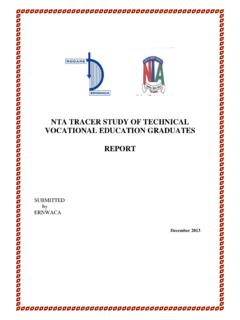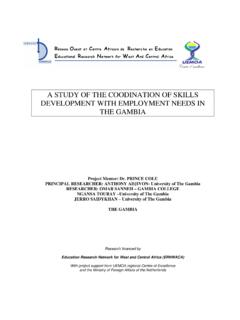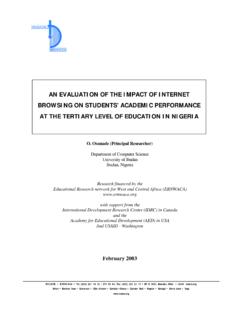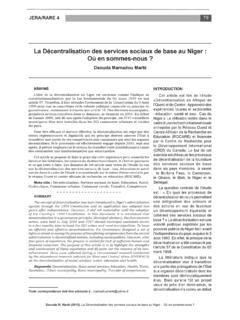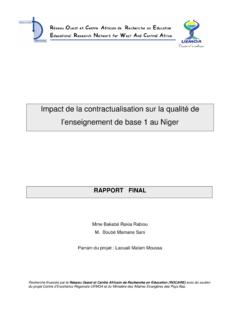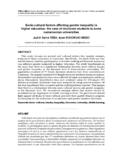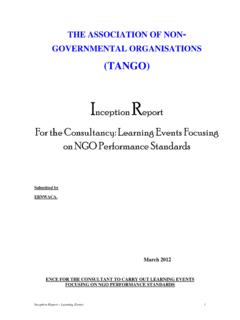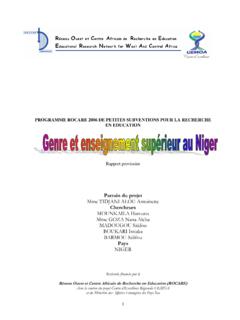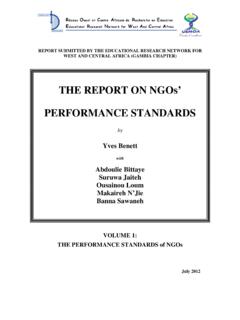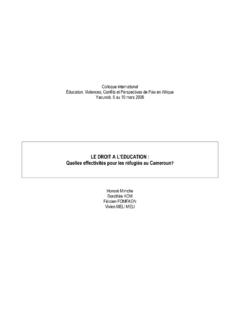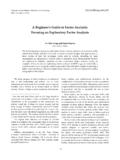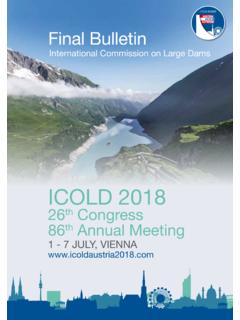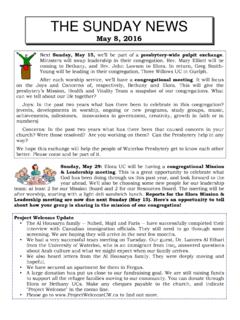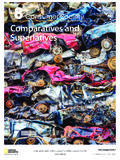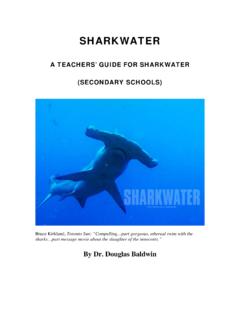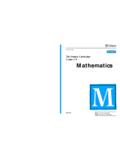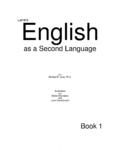Transcription of COST-REDUCING STRATEGIES AND LABORATORY ...
1 Researcher Professor Jonathan Ositadinma MOGBO Research Assistant Dr (Mrs) Felixtina JONSYN-ELLIS December, 2002 Banjul, The Gambia Research financed by the Educational Research Network for West and Central Africa (ERNWACA) in the context of his Small Grants Program, Competition 2002 with the support of the International Development Research Centre (IDRC) in Canada and in Senegal and the Academy for Educational Development (AED) and USAID Washington in USA COST-REDUCING STRATEGIES AND LABORATORY MANAGEMENT TECHNIQUES FOR BIOLOGY AND CHEMISTRY TEACHERS IN THE GAMBIA AND NIGERIA E R N W A C A - THE GAMBIA R seau Ouest et Centre Africain de Recherche en Education Educational Research Network for West And Central Africa ROCARE / ERNWACA Tel: (223) 221 16 12 / 674 83 84, Fax: (223) 221 21 15 BP E 1854, Bamako, MALI B nin Burkina Faso Cameroun C te d Ivoire Gambia Ghana Guin e Mali Nigeria S n gal Sierra Leon Togo Cost Reducing STRATEGIES and LABORATORY Management Techniques for Biology and Chemistry Teachers in The Gambia and Nigeria Object of the study .
2 The study explored the impact of experience, qualification, training programmes and location on the use of STRATEGIES involving cost-reduction and on the use of techniques involving LABORATORY management. The design, a survey was used in executing the study . The sample comprised 950 chemistry and biology teachers from Nigeria and The Gambia. Of this number which was selected on the basis of multi-stage random sampling technique, followed by stratification, the variables got were as follows: Nigerian Biology and Chemistry teachers 800, their Gambian counterparts 150, all biology teachers irrespective of country = 500, their chemistry counterparts 450, Urban-based teachers 225; their rural based counterparts 225.
3 The two questionnaire developed and validated by the researcher were used in collecting the pertinent data. Content and face validities were established for the instrument. The research questions were answered using means and standard deviations while the hypotheses were tested using either two-way analysis of variance or critical ratio ata level of significance, as appropriate. Overall Summary of Major Findings: Chemistry and biology teachers moderately employed COST-REDUCING STRATEGIES and LABORATORY management techniques. However their use of these STRATEGIES for each of the 15 items indicated in the first questionnaire and their use of the techniques for each of the 24 items indicated in the second questionnaire were classified into extensive , moderate and sparse for the first set of items, and efficient , moderately efficient and inefficient for the second set of items.
4 The study in addition indicated that urban-based chemistry and biology teachers whether for the use of COST-REDUCING STRATEGIES or for the use of LABORATORY management techniques, employed these skills better than their rural-based counterparts. The study also showed that whereas chemistry and biology teachers with high experience, high qualification and high participation in in-service training programme extensively used COST-REDUCING STRATEGIES and LABORATORY management techniques, their counterparts with average qualification, average experience and average participation in in-service training programmes, played second fiddle roles, while the lowly qualified, experienced and low participants in in-service training brought up the rear although were, in some cases, as moderate in the use of it as their average in status counterparts.
5 Chemistry and biology teachers in Nigeria performed better than their Gambian counterparts in the use of COST-REDUCING STRATEGIES and LABORATORY management techniques. Chemistry teachers in both Nigeria and The Gambia employed these techniques, whether it is in the use of cost-reduction or in the use of LABORATORY management techniques, better than their biology counterparts. The study equally showed that at level of significance, the following variables were significant factors in the use of COST-REDUCING STRATEGIES : - experience, participation in in-service training programme, qualification, location, country of residence, subject background. Similarly at the same level of probability the following factors significantly influenced the teachers use of LABORATORY management techniques: experience, participation in in service training programme, qualification, location, subject area.
6 Recommendations Finally emphasis was placed on cheaper but adequate experimental designs and on simpler LABORATORY skills. The successful application of each would depend on the periodic update of skills through organized training programmes. For experienced and lowly qualified teachers, their lack of experience and qualification can be counterbalanced by organized pre-service training programmes replicated in defined periods. Furthermore, the distribution inbalance between urban-based and rural-based schools can be redressed by ensuring that enabling facilities (materials and human) on which good LABORATORY management is predicated upon are improved upon in rural areas conditions that make for life and living are enhanced in rural areas.
7 TABLE OF CONTENTS Chapter One ..5 Statement of the problem ..5 Research objectives ..7 Research hypotese ..7 Scop of the study ..7 Justification of study ..8 Chapter Two ..9 The research Methodology ..9 Method of Investigation ..9 Area of the study ..9 Population of the study ..9 Sample size and sampling technique ..9 Analysis of data ..10 Validation of the instrument ..10 Method of data Analysis ..10 Chapter three ..12 Presentation data and result ..12 Observations ..30 Summary of Major finding ..37 Chapter Four ..40 Discussion, Conclusion, Recommandation ..40 Repair and Maintenance of Equipement ..44 Education Implication of the findings ..51 Recommendation ..51 Suggestion for further research work ..52 Limitation of the study ..52 References.
8 54 Genre et manuels scolaires, ROCARE-Mali, Programme petites subventions 2003 / Page 5 Chapter One Introduction Background to the study The facilities for science education are fast dwindling. For this reason there is dire need for science teachers to apply innovative STRATEGIES that call for cost-reduction of materials and methods. It is also important that modern techniques that invite the use of good LABORATORY management should be invoked. The need for COST-REDUCING STRATEGIES and good LABORATORY management techniques has more than ever before become very necessary. In the first instance, activity-oriented curricula have imposed a high demand on LABORATORY facilities, without which, effective teaching and learning cannot take place (Bomide, 1985).
9 Speaking in the same vein, Alonge (1991) had contended that there had been an explosion in school enrolment, a situation that had been exacerbated by a declining economy. With such an unweildiness in the number of students admitted, the availability of science materials will be short-changed, thus making teaching and learning most ineffective. Ogunniyi (1998) blamed bad science teaching on lack of LABORATORY assistants, teachers' inability to improvise and careless attitude of students to LABORATORY facilities among others. Mbaekwe (1993) argued that education planners, especially those of them outside the realm of science, would not see why the running of science education would cost more than those of other disciplines, blaming them for this debilitating situation.
10 In addition, according to him, the provision of facilities could not keep pace with the rise in students' population, and above all, the various governments within the underdevelopment catchments were strapped of cash or so it seemed. To execute the discovery method which has been widely acknowledged to be the linch-pin of pedagogy in the sciences, is monetarily exerting if it has to be executed successfully, because it will require a lot of money to purchase equipment and materials. This view has variously been put across by Mani (1993), Mojekwu (1999), Chukwuemeka (1999), all leading to the inescapable fact that COST-REDUCING STRATEGIES (CRS) are urgently needed. CRS according to Mogbo (1993) cannot be tagged to a definite reference point.
